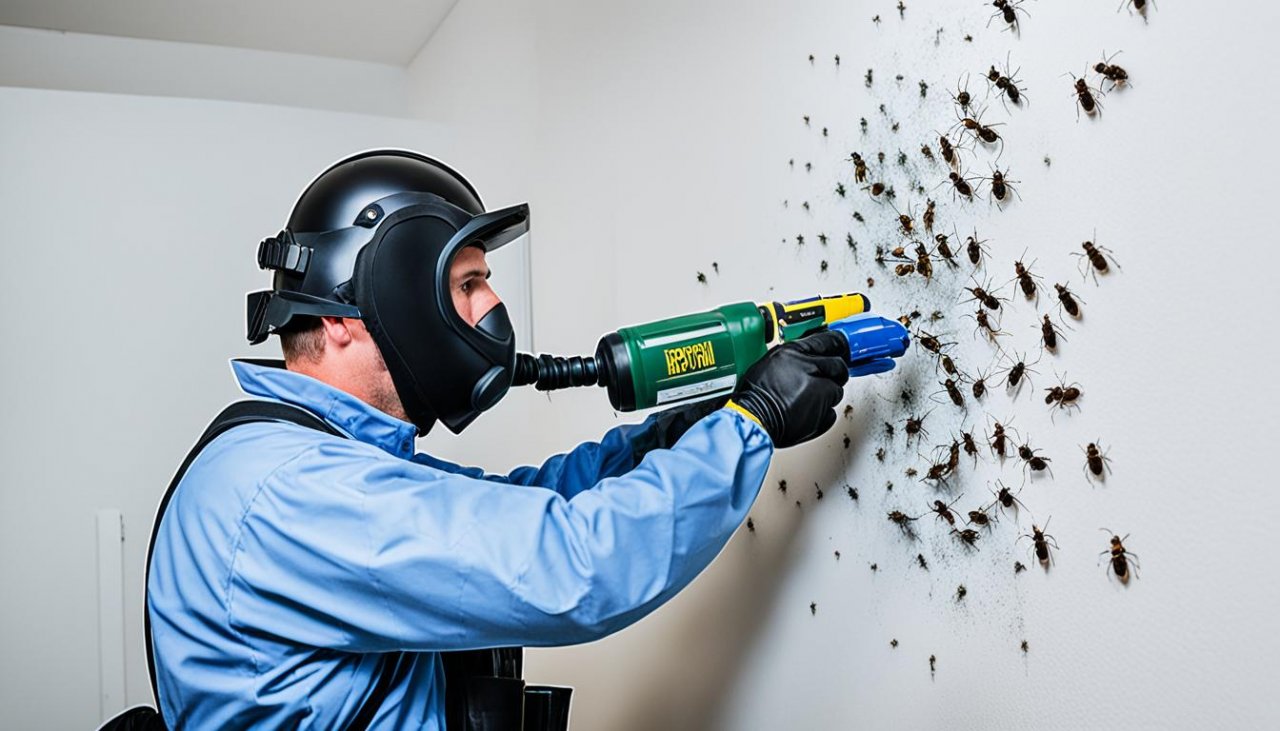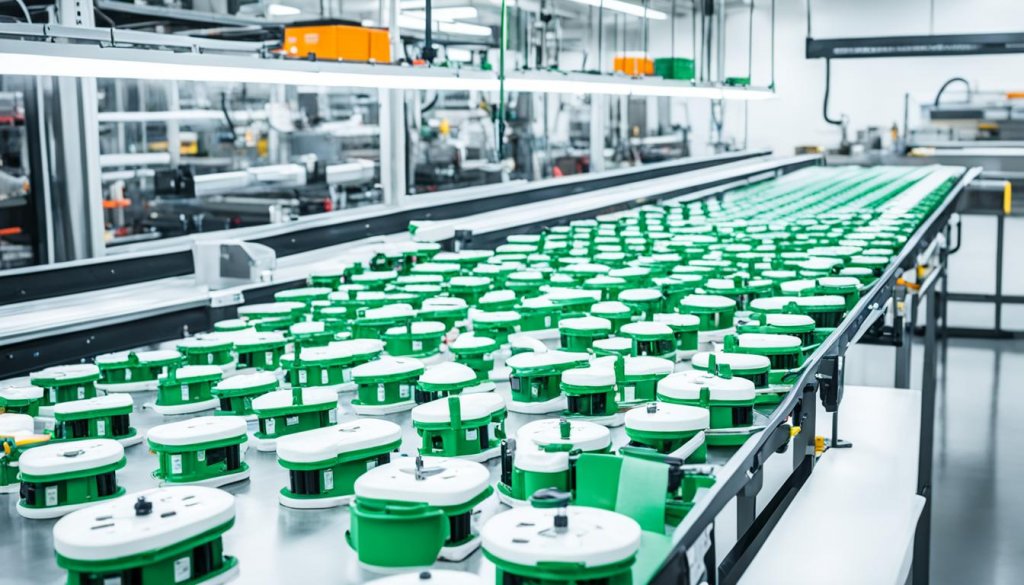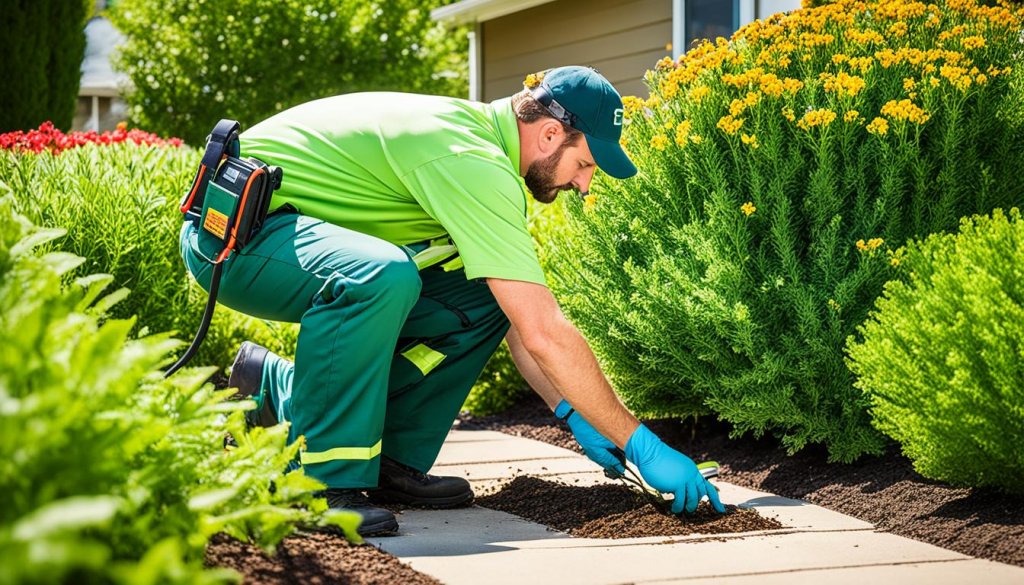I recall a time when a family called me frantically about cockroaches. They were overwhelmed and panicked. I quickly set up an inspection and arrived in hours. This showed how urgent pest control services can be. The key to success is being efficient in our work.
In today’s competitive world, pest control companies must work smarter. We need to streamline our work, invest in training, and use the latest technology. By doing this, we ensure our customers get the best service. We also boost our profits and work better. The tips I’ll share can greatly improve how pest control companies work. This leads to happier customers and more trust.

Key Takeaways
- Operational efficiency can drastically improve service delivery in pest control.
- Regular training keeps technicians skilled and up-to-date with industry standards.
- Integrated Pest Management enhances effectiveness by focusing on prevention.
- Technology streamlines operations and increases overall productivity.
- Strong customer relationships lead to repeat business and loyalty.
- Regular pest inspections can prevent severe infestations, saving time and resources.
- Adhering to safety protocols ensures a secure experience for clients and their families.
Understanding the Importance of Operational Efficiency
Operational efficiency is key to a pest control business’s success. With 80% of the U.S. population living in cities, the need for reliable pest control grows. By focusing on being more efficient, companies can cut costs, improve service, and make customers happier.
Efficient scheduling is crucial for a pest control business to thrive. Tools like FieldRoutes scheduling software help optimize routes and manage data in real-time. This approach cuts down on travel time and lets companies do more jobs each day, saving on fuel costs. It’s vital for handling the seasonal spikes in demand.
Knowing what customers want is also crucial. Most prefer evenings and weekends for appointments. By listening to these needs, technicians can plan better, making customers happier and more likely to come back. Plus, managing technician time well boosts productivity. It makes reassigning jobs and using special skills easier with the right software.
Adding operational efficiency to a pest control business helps cut costs and boost customer satisfaction. As the industry changes, companies that focus on efficiency will likely do better in the long run. They gain a competitive edge in busy cities.
Streamline Workflow Processes
Streamlining workflow processes is key to better pest management. By looking closely at how things work, I can find ways to cut down on delays. This makes my service faster and more efficient.
Looking at the current workflow helps me spot where things get slow. Then, I can make changes to save time and money.
Identifying and Minimizing Bottlenecks
Finding and fixing bottlenecks can really change how efficient I am. I check my schedule often to make sure I answer client requests quickly. This helps me work better and give top-notch pest control services.
Optimizing Scheduling and Route Planning
Getting scheduling and route planning right is crucial for being efficient. Good route planning can cut down travel distances and fuel costs by up to 30%. Using GPS trackers lets me keep an eye on where my technicians are.
This means I can make sure routes are the best they can be and cut down on travel time. With route optimization software, I use real-time traffic info to save time and fuel. This lets me do more jobs and make customers happier.

Invest in Training and Development
For any pest control company aiming for top performance, investing in training and growth is key. With over 34,000 pest control businesses in the U.S., it’s vital to have a skilled team ready for various challenges. By focusing on skill improvement through pest control certifications, technicians can offer top-notch services. This boosts customer satisfaction and trust.
Enhancing Skill Sets for Technicians
Improving technician skills is a smart move that greatly enhances service quality. Training that includes hands-on activities and regular checks ensures staff are up to date with the latest tools and tech. This training helps reduce the risk of pesticide resistance by keeping staff informed about new products and eco-friendly methods.
Providing Ongoing Professional Development
Keeping technicians updated on industry trends, rules, and new pest management methods is essential. The pest control field is changing with new tech, so continuous learning helps stay ahead. Committing to growth not only keeps technicians happy but also builds a knowledgeable team. This leads to more referrals and strong customer ties.
Implement Integrated Pest Management (IPM)
Using Integrated Pest Management (IPM) is key for pest control companies today. I focus on stopping pests before they start and keeping an eye on them. This way, I avoid just using chemicals all the time. It helps keep the ecosystem balanced and makes customers feel safe and green.
Focusing on Prevention and Monitoring
Preventing pests is a big part of IPM. I watch for pests often to catch issues early. This stops big infestations before they start. It also cuts down on risks to people, animals, and the planet.
Regular checks keep places safe and give customers peace of mind.
Offering Eco-Friendly Solutions to Customers
More and more, customers want pest control that’s good for the planet. I’ve changed my services to be more green. This makes me known for caring about the environment.
Using natural and cultural ways to fight pests means I use fewer chemicals. This makes the world safer and cleaner for my customers and their families.

Leverage Technology Solutions
Using technology in pest control makes operations smoother and boosts service quality. It helps businesses work better and please their customers more. By embracing new tech, companies can do more with less, making a big difference in how happy customers are.
Utilizing Pest Control Management Software
Pest control management software is key for today’s businesses. It automates tasks like scheduling, billing, and talking to customers. This means fewer mistakes and happier clients. Tools like FieldRoutes help optimize routes and improve communication, keeping things running smoothly.
With more automation, technicians spend more time on actual service and less on paperwork. This leads to better service for everyone.
Automating Operations for Increased Efficiency
Automation is crucial for making pest control operations more efficient. With strong software, tracking customer interactions becomes easier, building stronger relationships. This helps avoid mistakes that could hurt profits.
Using tech for scheduling and billing cuts down on errors and makes things simpler. By automating routine tasks, I can offer top-notch service, manage my time well, and make customers happier!
Enhance Inventory Management
Effective inventory management is key to my pest control business’s success. I know how to set up strong systems to keep products and tools ready for each job. This way, I avoid delays and reduce waste.
By keeping an eye on stock levels, I make sure technicians are always ready for any pest job. This proactive approach is crucial for my business.
Implementing Effective Inventory Systems
Using advanced inventory tools is a must for managing my pest control inventory well. These tools help track important details like product history and where it came from. This is crucial for meeting quality and compliance standards.
It’s important to focus on the 20% of products that make up 80% of my sales. This targeted approach helps me cut waste and use storage space more efficiently.
Reducing Waste and Ensuring Product Availability
Checking on supplier reliability is a big part of my inventory strategy. By looking at fill rates and order issues, I keep products in stock for customers. Using mobile tech has also made managing inventory easier and faster.
By handling slow-moving and old inventory well, my operations get more efficient. This leads to a healthier bottom line for my business.
Focus on Customer Relationship Management (CRM)
A strong customer relationship management strategy is key in the pest control business. It helps me manage customer interactions well. This lets me track service histories, communicate smoothly, and customize services for each customer’s needs.
This approach boosts customer satisfaction and helps the business grow. It does this by building loyalty and encouraging customers to come back.
Managing Customer Interactions Effectively
Using a pest control CRM makes tracking customer interactions simple for me. It has features like customizable message centers. These let me send out reminders, quotes, and invoices automatically.
Customers like getting updates through their preferred method, like email, text, phone, or mail. This shows I care and builds trust.
Building Strong Relationships for Repeat Business
Building strong relationships is key to a loyal customer base. A reliable CRM system helps make processes smoother. This can cut response times for service requests by up to 30%.
This means I can keep in touch with customers regularly. This leads to higher customer retention rates. In fact, using CRM technology can increase customer retention by 20%. This is crucial in the competitive pest control industry for getting repeat business.
Pest Control Services: Provide Regular Pest Inspections
Regular pest inspections are key to effective pest control. They help spot problems early, allowing for quick action. By checking properties once a year, especially in termite hotspots, we can stop big problems before they start.
This approach saves money on repairs and keeps properties safe. It also gives homeowners peace of mind. A thorough inspection takes about 30 minutes to an hour, depending on the property and pest issues.
Identifying Potential Problems Early
Regular checks are crucial for pest prevention. Catching infestations early keeps properties safe and maintains their value. This proactive approach not only deals with current risks but also ensures peace of mind for homeowners.
Creating a Maintenance Schedule for Clients
Setting up maintenance schedules means regular pest checks. The frequency can be monthly to quarterly, based on the client’s needs and risks. By focusing on prevention like sealing entry points and installing barriers, we protect homes effectively.
Regular inspections reduce health risks and stop diseases spread by pests. This makes them a key service for a safe and pleasant home.
See how FieldAx can transform your Field Operations.
Try it today! Book Demo
You are one click away from your customized FieldAx Demo!
FAQ
What are operational efficiency strategies in pest control services?
Operational efficiency strategies in pest control include making workflows smoother, training technicians well, and using Integrated Pest Management (IPM). They also involve using technology and managing inventory better. These steps make services better and customers happier.
How can I enhance my pest control business’s productivity?
To boost productivity, look at how you schedule jobs to cut down on waiting times. Plan routes better to save time on the road. Use pest control software to handle paperwork automatically. This lets your team focus more on getting rid of pests.
Why is technician training important in pest control?
Training technicians is key because it gives them the skills to tackle different pest problems well. It keeps them up-to-date with new methods, rules, and safety steps. This leads to better service and happier customers.
What is Integrated Pest Management (IPM)?
Integrated Pest Management (IPM) is a way to manage pests that focuses on preventing and monitoring them, not just using chemicals. It uses eco-friendly methods, which appeals to customers who care about the environment.
How can technology improve my pest control operations?
Technology helps by automating tasks like scheduling, sending invoices, and talking to customers. This cuts down on mistakes, makes things more efficient, and lets technicians focus on their work.
What role does inventory management play in pest control services?
Good inventory management makes sure pest control companies have what they need for each job. It keeps track of stock, cuts down on waste, and stops delays. This makes the business run smoother.
How can a strong customer relationship management (CRM) system benefit my business?
A strong CRM system makes customers happier by managing their interactions well, keeping track of their service history, and tailoring services to them. This builds loyalty, gets more repeat business, and grows a strong network of referrals.
Why are regular pest inspections important?
Regular pest inspections are crucial for catching problems early and stopping big infestations. By having set maintenance plans, pest control companies show they are proactive. This makes customers much happier.
Author Bio
Co-Founder & CMO at Merfantz Technologies Pvt Ltd | Marketing Manager for FieldAx Field Service Software | Salesforce All-Star Ranger and Community Contributor | Salesforce Content Creation for Knowledge Sharing





